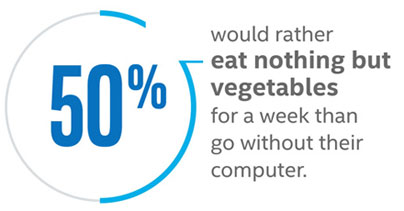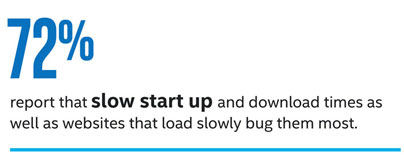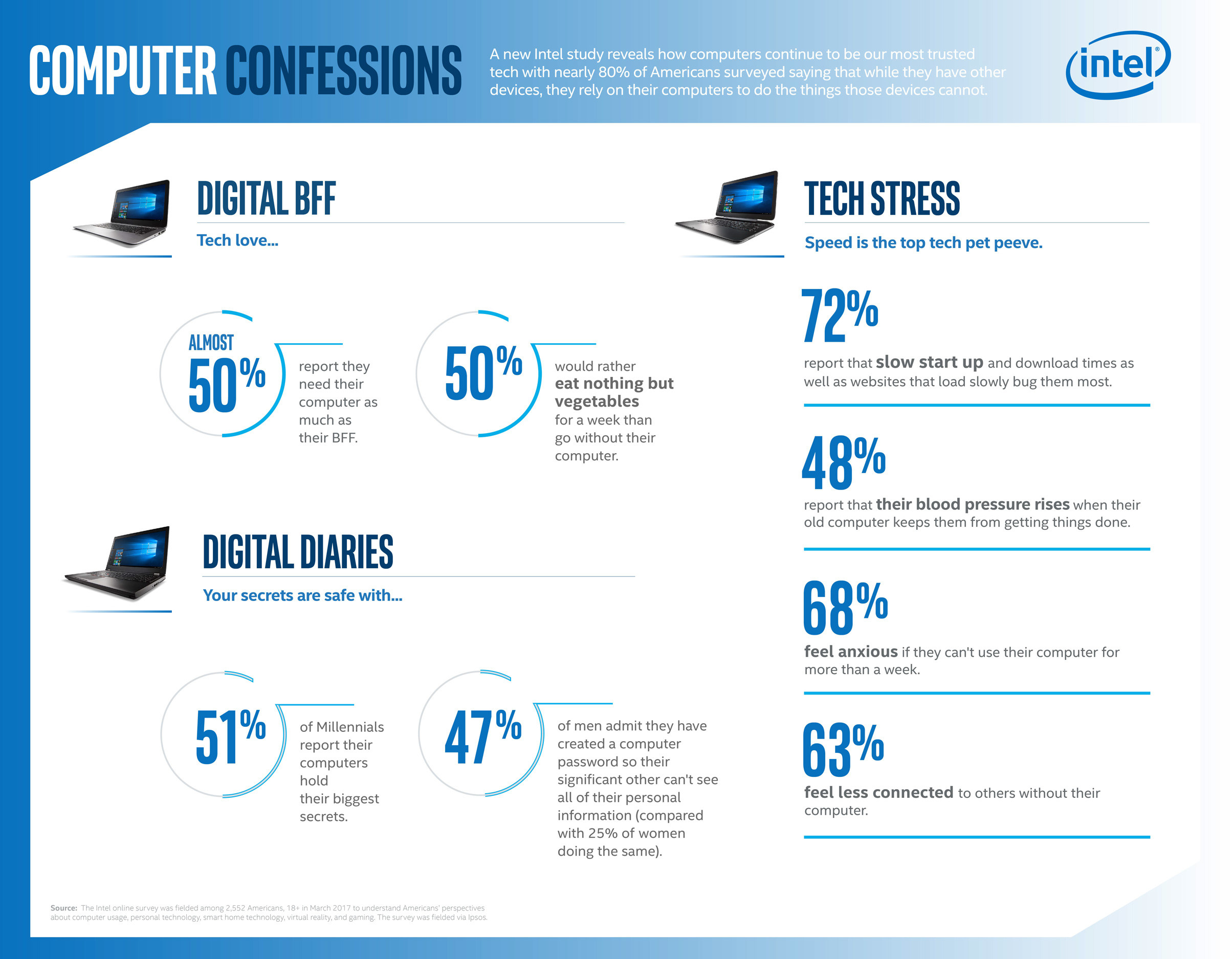A new study commissioned by chip-maker Intel revealed some interesting information on how people feel about computers, including the fact that they’re willing to go without coffee and even cash for longer than going without a computer.
This reminds me of an older study performed by F-Secure, which uncovered that people are willing to give up a lot to get free Wi-Fi, including their firstborn child or their favorite pet. But let’s not get distracted.
Smartphones and tablets are more popular than ever, but you still can’t go without your trusty computer, and Intel makes that perfectly clear in a study entitled "People and Their PCs: The State of Personal Technology."
Even though you own other devices, like a smartphone or a tablet, your computer remains your most trusted technology device. You rely on it to do the things a mobile cannot, you get anxious when you can’t use it, and you can’t go without it for very long.
According to Intel, most people can’t go without a computer for more than 13 days. That may sound like a lot of time, but it really isn’t, not when you compare it with a few other things you could go without. Such as…
Out of all the people that Intel surveyed for its study, 46% said that they need their computer just as much as they need their best friend.
And 50% said that they would rather eat nothing but vegetables for a week than go without their computer.

If you recently bought a new PC, a powerful computer that can handle everything you ask of it, then that’s great! You’re better off that the 400 million people who have an outdated computer that’s causing then nothing but grief. So much grief that 48% said that their blood pressure rises when their old computer keeps them from getting things done.
But by far the most annoying thing about having an old PC is the speed – or lack thereof. 72% are upset about slow startup times, long download times, and websites that take much too long to load.

When a PC takes too long to start, you might want to check and see what applications are set to automatically run at startup. You can see which applications do that from the Task Manager’s Startup Section or by using one of a tool like Glarysoft Quick Startup, T3 Startup Manager, SterJo Startup Patrol, Anvi Startup Booster, WhatInStartup, or AutoRuns. Personally, I use CCleaner to manage startups and to keep my PC clean.
If a download takes too long, the problem may be with your internet connection, not your PC. Here are 10 free tools that you can use to test your internet speed.
And if a website takes too long to load, it might be because it’s wasting a lot of time on ads. You could try an ad blocker and see if that helps. I currently use uBlock Origin, Mozilla’s Pick of the Month add-on for May 2016, and I couldn’t be happier.
On the bright side, you’re not the only one who is frustrated with your old computer. Michael Phelps is frustrated too!
Intel's study is based on a survey conducted by Ipsos, survey performed on 2,552 Americans, 18+ in March 2017 to understand Americans’ perspectives about computer usage, personal technology, smart home technology, virtual reality and gaming.
Intel Newsroom used part of the findings to create the infographic below.

In related news...
Groupon was curious to find out how much time families plan on spending on their electronic devices this summer. So it ran a survey and found that families will spend around 6 hours a day in front of a screen, which amounts to 35 days or one third of their entire summer.
This reminds me of an older study performed by F-Secure, which uncovered that people are willing to give up a lot to get free Wi-Fi, including their firstborn child or their favorite pet. But let’s not get distracted.
Smartphones and tablets are more popular than ever, but you still can’t go without your trusty computer, and Intel makes that perfectly clear in a study entitled "People and Their PCs: The State of Personal Technology."
Even though you own other devices, like a smartphone or a tablet, your computer remains your most trusted technology device. You rely on it to do the things a mobile cannot, you get anxious when you can’t use it, and you can’t go without it for very long.
According to Intel, most people can’t go without a computer for more than 13 days. That may sound like a lot of time, but it really isn’t, not when you compare it with a few other things you could go without. Such as…
- Caffeine – 53 days
- Cash – 50 days
- Carbs – 19 days
- Not talking to family members – 18 days
Out of all the people that Intel surveyed for its study, 46% said that they need their computer just as much as they need their best friend.
And 50% said that they would rather eat nothing but vegetables for a week than go without their computer.

If you recently bought a new PC, a powerful computer that can handle everything you ask of it, then that’s great! You’re better off that the 400 million people who have an outdated computer that’s causing then nothing but grief. So much grief that 48% said that their blood pressure rises when their old computer keeps them from getting things done.
But by far the most annoying thing about having an old PC is the speed – or lack thereof. 72% are upset about slow startup times, long download times, and websites that take much too long to load.

When a PC takes too long to start, you might want to check and see what applications are set to automatically run at startup. You can see which applications do that from the Task Manager’s Startup Section or by using one of a tool like Glarysoft Quick Startup, T3 Startup Manager, SterJo Startup Patrol, Anvi Startup Booster, WhatInStartup, or AutoRuns. Personally, I use CCleaner to manage startups and to keep my PC clean.
If a download takes too long, the problem may be with your internet connection, not your PC. Here are 10 free tools that you can use to test your internet speed.
And if a website takes too long to load, it might be because it’s wasting a lot of time on ads. You could try an ad blocker and see if that helps. I currently use uBlock Origin, Mozilla’s Pick of the Month add-on for May 2016, and I couldn’t be happier.
On the bright side, you’re not the only one who is frustrated with your old computer. Michael Phelps is frustrated too!
Intel's study is based on a survey conducted by Ipsos, survey performed on 2,552 Americans, 18+ in March 2017 to understand Americans’ perspectives about computer usage, personal technology, smart home technology, virtual reality and gaming.
Intel Newsroom used part of the findings to create the infographic below.

In related news...
Groupon was curious to find out how much time families plan on spending on their electronic devices this summer. So it ran a survey and found that families will spend around 6 hours a day in front of a screen, which amounts to 35 days or one third of their entire summer.

























